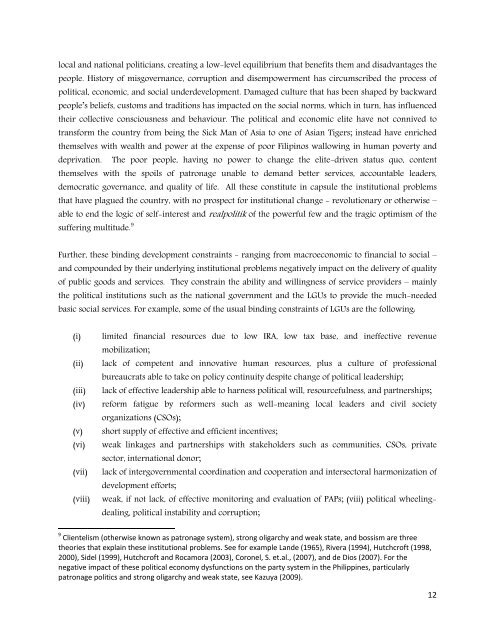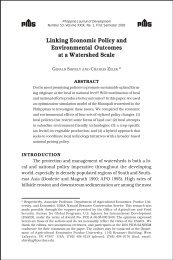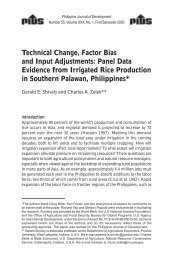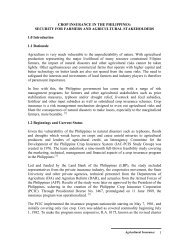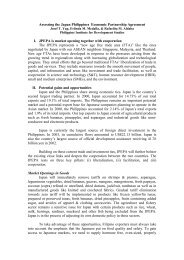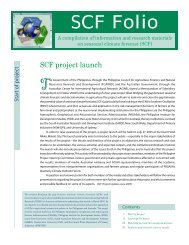Triangulation Framework for Local Service Delivery - Philippine ...
Triangulation Framework for Local Service Delivery - Philippine ...
Triangulation Framework for Local Service Delivery - Philippine ...
Create successful ePaper yourself
Turn your PDF publications into a flip-book with our unique Google optimized e-Paper software.
local and national politicians, creating a low-level equilibrium that benefits them and disadvantages the<br />
people. History of misgovernance, corruption and disempowerment has circumscribed the process of<br />
political, economic, and social underdevelopment. Damaged culture that has been shaped by backward<br />
people’s beliefs, customs and traditions has impacted on the social norms, which in turn, has influenced<br />
their collective consciousness and behaviour. The political and economic elite have not connived to<br />
trans<strong>for</strong>m the country from being the Sick Man of Asia to one of Asian Tigers; instead have enriched<br />
themselves with wealth and power at the expense of poor Filipinos wallowing in human poverty and<br />
deprivation. The poor people, having no power to change the elite-driven status quo, content<br />
themselves with the spoils of patronage unable to demand better services, accountable leaders,<br />
democratic governance, and quality of life. All these constitute in capsule the institutional problems<br />
that have plagued the country, with no prospect <strong>for</strong> institutional change - revolutionary or otherwise –<br />
able to end the logic of self-interest and realpolitik of the powerful few and the tragic optimism of the<br />
suffering multitude. 9<br />
Further, these binding development constraints - ranging from macroeconomic to financial to social –<br />
and compounded by their underlying institutional problems negatively impact on the delivery of quality<br />
of public goods and services. They constrain the ability and willingness of service providers – mainly<br />
the political institutions such as the national government and the LGUs to provide the much-needed<br />
basic social services. For example, some of the usual binding constraints of LGUs are the following:<br />
(i)<br />
(ii)<br />
(iii)<br />
(iv)<br />
(v)<br />
(vi)<br />
(vii)<br />
(viii)<br />
limited financial resources due to low IRA, low tax base, and ineffective revenue<br />
mobilization;<br />
lack of competent and innovative human resources, plus a culture of professional<br />
bureaucrats able to take on policy continuity despite change of political leadership;<br />
lack of effective leadership able to harness political will, resourcefulness, and partnerships;<br />
re<strong>for</strong>m fatigue by re<strong>for</strong>mers such as well-meaning local leaders and civil society<br />
organizations (CSOs);<br />
short supply of effective and efficient incentives;<br />
weak linkages and partnerships with stakeholders such as communities, CSOs, private<br />
sector, international donor;<br />
lack of intergovernmental coordination and cooperation and intersectoral harmonization of<br />
development ef<strong>for</strong>ts;<br />
weak, if not lack, of effective monitoring and evaluation of PAPs; (viii) political wheelingdealing,<br />
political instability and corruption;<br />
9 Clientelism (otherwise known as patronage system), strong oligarchy and weak state, and bossism are three<br />
theories that explain these institutional problems. See <strong>for</strong> example Lande (1965), Rivera (1994), Hutchcroft (1998,<br />
2000), Sidel (1999), Hutchcroft and Rocamora (2003), Coronel, S. et.al., (2007), and de Dios (2007). For the<br />
negative impact of these political economy dysfunctions on the party system in the <strong>Philippine</strong>s, particularly<br />
patronage politics and strong oligarchy and weak state, see Kazuya (2009).<br />
12


